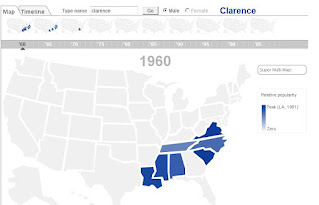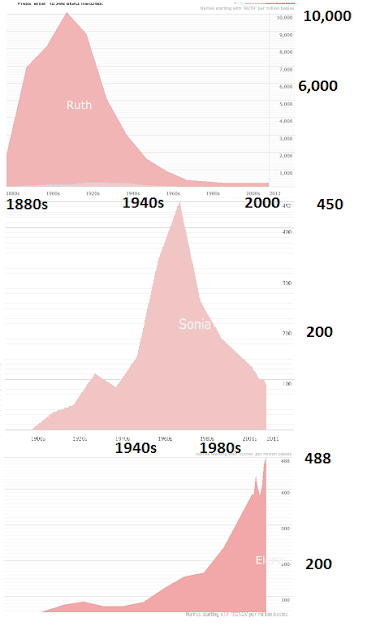Why stop with the most recent year? The curious can visit the Social Security Administration's Popular Baby Names site and find out how a name has ranked going back to 1922. (The first Social Security card was issued in November 1936.)
My own name, Mary, was #1 the year I was born. It was in the top 5 from 1922 through 1967, but has now toppled to #112.
A commercial site, the Baby Name Wizard, presents name data with beautiful graphs and maps. In NameVoyager you can see Mary's sharp decline over time. Using the map feature, you can see that Cesar is popular in California and the Southwest, while Charles is most popular in the Southeast (and has declined in popularity since the 1960s).
Most of the Supreme Court Justices have names in the mainstream. Chief Justice John Roberts was born in 1955, when John was the 5th most common boy's name. Samuel was #62 in 1950, when Samuel Alito was born. Stephen Breyer (1938) got the 74th most popular boy's name his year. (Steven was #184.)
Antonin Scalia is the outlier, with his first name never appearing in the top 1,000. But Anthony, which is close, was #48 the year he and his colleague Anthony Kennedy were born (1936). (By the way, the "A" in Samuel A. Alito is for Anthony.)
Clarence was #87 in 1948, when Justice Clarence Thomas was born. NameMapper doesn't go back that far, but in 1960, Clarence was popular in the Southeast, in the states surrounding Justice Thomas's home state of Georgia.
 |
| Map: popularity of Clarence in 1960 |
 |
| Popularity of Ruth, Sonia, and Elena (babies per million) |
Unless you look carefully, you might not notice that the graphs don't have the same scale. (I added the numbers in the large font.) Ruth hit its peak at over 10,000 per million babies. (That was in the 1910s, when it was #5 for girls.) Sonia's peak was about 452 per million. And, although Elena is definitely on the rise, it's still just 488 per million. If you added all the Sonias in their peak year to all the Elenas in their peak year, you would still have to multiply by ten to get close to the peak rate of naming baby girls Ruth.
So looking at ranking (what names are the most popular) is not the same as looking at prevalence (how many babies per million will have that name). Keep that in mind when you read statements about "the most dangerous city" or the "most effective drug."

For more on working intelligently with statistics, see Joel Best, Stat-Spotting: A Field Guide to Identifying Dubious Data, HM535 .B477 2008 at Good Reads. Catalog record. Publisher's page (includes sample chapter).
Graphics from searches on babynamewizard.com.

No comments:
Post a Comment